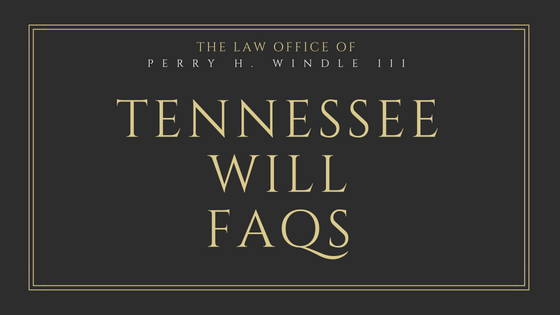Do you have questions about drafting a will?
Perry H. (Chip) Windle III has worked as an attorney in Knoxville, Tennessee for over 30 years. He has helped numerous clients prepare their wills. During his career, clients have asked Mr. Windle similar questions about their wills.
Mr. Windle compiled 5 common questions clients ask him about Tennessee wills and similar documents.
We hope this FAQ helps as you decide what steps to take to create your will or power of attorney. If you want to discuss your specific situation, please contact us today for your free consultation.
What Happens to My Assets If I Die Without a Will?
Intestate is the legal term that means someone died without a will.
The State of Tennessee has intestacy laws to designate where a person’s assets would go if they die without a will. Essentially, the state would decide who inherits the deceased’s assets.
In Tennessee, the heirs are determined by the individual’s relationship to the deceased.
If the deceased is survived by:
a spouse but no descendants → spouse inherits everything
children and no spouse → children inherit everything
a spouse and descendants → spouse and children equally share but spouse’s share is not less than 1/3
parents but no spouse or descendants → parents inherit everything
siblings but no spouse or descendants → siblings inherit everything
Can I Designate in My Will Who I Want to be the Guardian of My Minor Children?
Yes and this is very important. Unless you name guardians for your minor children in your last will, the court can determine who will be given custody after your death.
Do I Need a Will, Power of Attorney, Living Will and Health Care Agent?
Yes these are four separate documents and they all serve different purposes in your planning.
What is the Difference Between a Will and a Living Will?’
A will is a document which designates who will receive your assets upon your death. A living will is a legal document in which a person specifies what actions should be taken for their health if they are no longer able to make decisions for themselves.
What is an Executor of a Will?
The executor is the person you designate in your will to administer your estate. Their responsibilities include the probate of the will (court procedure to prove the document is the individual’s last will), locating assets, paying debts and distributing assets from the estate according to the terms of the will.
If you want to discuss the importance of getting these essential documents prepared, contact Perry H. (Chip) Windle III today. He is an experienced lawyer who is ready to help you with these matters.


Recent Comments